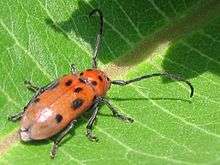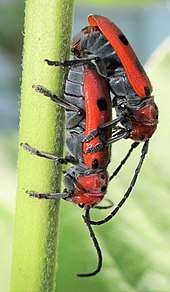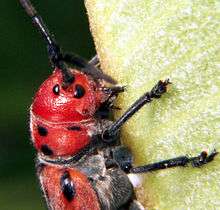Tetraopes tetrophthalmus
The red milkweed beetle (Tetraopes tetrophthalmus) is a beetle in the family Cerambycidae. The binomial genus and species names are both derived from the Ancient Greek for "four eyes." As in many longhorn beetles, the antennae are situated very near the eye–in the red milkweed beetle, this adaptation has been carried to an extreme: the antennal base actually bisects the eye. (See Figure 1.) The milkweed beetle, a herbivore, is given this name because they are generally host specific to milkweed plants (genus Asclepias). It is thought the beetle and its early instars derive a measure of protection from predators by incorporating toxins from the plant into their bodies, thereby becoming distasteful, much as the monarch butterfly and its larvae do. The red and black coloring are aposematic, advertising the beetles' inedibility. There are many milkweed-eating species of insect that use the toxins contained in the plant as a chemical defense.
| Red milkweed beetle | |
|---|---|
 | |
| Scientific classification | |
| Kingdom: | |
| Phylum: | |
| Class: | |
| Order: | |
| Family: | |
| Genus: | |
| Species: | T. tetrophthalmus |
| Binomial name | |
| Tetraopes tetrophthalmus Forster, 1771 | |


References
External links
- Red Milkweed Beetle Find large format reference quality diagnostic photographs and more information.